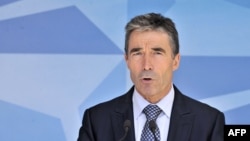LONDON —
NATO commanders in Afghanistan are scaling back some joint patrols with Afghan forces, following a spike in the number of 'insider attacks' on international soldiers.
Training and working alongside the Afghan National Security Forces is a central pillar of NATO's planned handover and withdrawal from Afghanistan in 2014. NATO says in only some cases 'operational tempo' has been reduced.
Secretary-General Anders Fogh Rasmussen said the measures are necessary and temporary.
"We remain committed to our goal of seeing the Afghans fully in charge of their own security by the end of 2014. So that is the bottom line. The goal is unchanged, the strategy remains the same, and the timeline remains the same," Rasmussen said.
Such measures have been seen before, says Brigadier Ben Barry, a military analyst at the International Institute for Strategic Studies in London.
"What I think this does illustrate though is how very sensitive NATO nations and the United States are becoming to their casualties, and casualties from these insider attacks in particular," Barry said.
Insider attacks, in which rogue Afghan soldiers or police turn their guns on international allies, have claimed the lives of 51 NATO troops this year - 15 in August.
British Parliament Member Bob Stewart is a former U.N. commander in Bosnia.
"I think it is about time, from London, we directed that our troops are not necessarily put in the front line ... Because I am fed up with watching our seriously good soldiers waste their lives, have their lives wasted by people who are meant to be our friends," Stewart said.
Analyst Ben Barry says there is little evidence to suggest the Taliban has infiltrated Afghan forces.
"The Taliban invariably claim responsibility for these attacks and there is good evidence that they will sometimes seek to help the attackers in evading arrest by the Afghan forces or by NATO. But up to now the evidence has been that very few of these attacks have actually been conducted by Taliban infiltrators," Barry said.
Partnering between international and Afghan forces will continue at battalion level. Barry says it is the small-scale mentoring that will be affected.
"Where a small A-team of Green Berets [U.S. Army Special Forces] goes and lives in an Afghan village that has decided to renounce the Taliban along with a platoon-sized contingent of locally-raised Afghan police. Now quite clearly that suspension of those lower-level operations is going to cause difficulties and problems," Barry said.
NATO says the restrictions are also in response to increased tensions across the region following protests against the release of an on-line, low-budget video 'Innocence of Muslims'. A suicide bombing Tuesday in Kabul killed at least 12 people including Russians and South Africans; an insurgent group called Hezb-e-Islami said it carried out the attack in retaliation for the film.
Training and working alongside the Afghan National Security Forces is a central pillar of NATO's planned handover and withdrawal from Afghanistan in 2014. NATO says in only some cases 'operational tempo' has been reduced.
Secretary-General Anders Fogh Rasmussen said the measures are necessary and temporary.
"We remain committed to our goal of seeing the Afghans fully in charge of their own security by the end of 2014. So that is the bottom line. The goal is unchanged, the strategy remains the same, and the timeline remains the same," Rasmussen said.
Such measures have been seen before, says Brigadier Ben Barry, a military analyst at the International Institute for Strategic Studies in London.
"What I think this does illustrate though is how very sensitive NATO nations and the United States are becoming to their casualties, and casualties from these insider attacks in particular," Barry said.
Insider attacks, in which rogue Afghan soldiers or police turn their guns on international allies, have claimed the lives of 51 NATO troops this year - 15 in August.
British Parliament Member Bob Stewart is a former U.N. commander in Bosnia.
"I think it is about time, from London, we directed that our troops are not necessarily put in the front line ... Because I am fed up with watching our seriously good soldiers waste their lives, have their lives wasted by people who are meant to be our friends," Stewart said.
Analyst Ben Barry says there is little evidence to suggest the Taliban has infiltrated Afghan forces.
"The Taliban invariably claim responsibility for these attacks and there is good evidence that they will sometimes seek to help the attackers in evading arrest by the Afghan forces or by NATO. But up to now the evidence has been that very few of these attacks have actually been conducted by Taliban infiltrators," Barry said.
Partnering between international and Afghan forces will continue at battalion level. Barry says it is the small-scale mentoring that will be affected.
"Where a small A-team of Green Berets [U.S. Army Special Forces] goes and lives in an Afghan village that has decided to renounce the Taliban along with a platoon-sized contingent of locally-raised Afghan police. Now quite clearly that suspension of those lower-level operations is going to cause difficulties and problems," Barry said.
NATO says the restrictions are also in response to increased tensions across the region following protests against the release of an on-line, low-budget video 'Innocence of Muslims'. A suicide bombing Tuesday in Kabul killed at least 12 people including Russians and South Africans; an insurgent group called Hezb-e-Islami said it carried out the attack in retaliation for the film.




